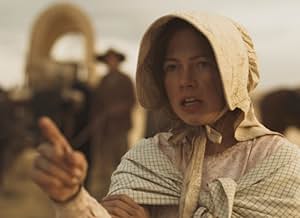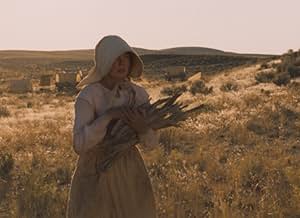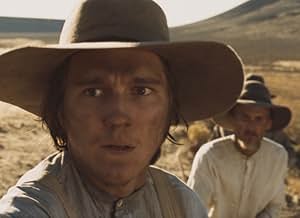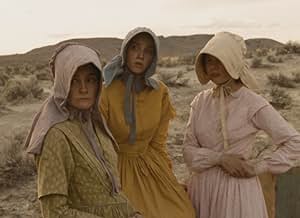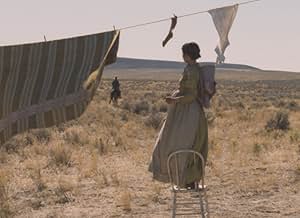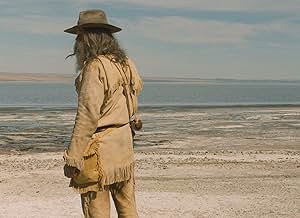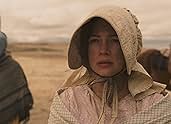IMDb-BEWERTUNG
6,5/10
15.862
IHRE BEWERTUNG
Siedler, die 1845 durch die Wüste von Oregon reisten, fanden sich unter harten Bedingungen gestrandet wieder.Siedler, die 1845 durch die Wüste von Oregon reisten, fanden sich unter harten Bedingungen gestrandet wieder.Siedler, die 1845 durch die Wüste von Oregon reisten, fanden sich unter harten Bedingungen gestrandet wieder.
- Auszeichnungen
- 7 Gewinne & 14 Nominierungen insgesamt
Empfohlene Bewertungen
Its unorthodox – 'revisionist' – take on the Western will stimulate more debate than the story itself. It's sure to be praised for its presumed artistic qualities, but I watch Westerns for their brio and sense of fun, never as art.
My verdict is that 'Meek's Cutoff' is slow – definitely slow and not 'well-paced' – desultory and monotonous. And yet every time the film was on the cusp of being disengaging, it did something to regain my attention. I saw the film twice and still couldn't decide what it was about. This is a film of suggestion. We're responsible for how the story ends.
After a wordless opening, we encounter a motley crew, some Irish but mostly American. They're being escorted, along with their few wagons, donkeys, horses and oxen, across the beautiful and baleful Oregon plains to a valley, where we assume they will settle. Their escort is Stephen Meek (Bruce Greenwood), a loquacious, over-friendly cowboy, who has a tacit propensity for violence.
An etching by one of the band (prolific youngster Paul Dano) on a dead tree updates us on their progress: 'Lost' (something inhabitants never are in Westerns; their sense of geography is always mind-bogglingly good). They've been travelling for several days in the wrong direction and are in desperate need of water. Meek insists they will reach their destination soon.
Film factotum Kelly Reichardt, here director and editor, keeps us in the dark for much of the film. The camera pans back when there is conversation. What dialogue we do hear is muffled and limited (or incomprehensible when spoken by Meek). It's like we're eavesdropping and aren't supposed to know something.
A solitary Native American is spotted. His presence in these deathly quiet lands frightens the band. He is captured by Meek and Solomon Tetherow (Will Patton). Some argue that he will lead them to more Indians, so should be killed; but Solomon reasons that he can be used to lead them to water and their destination.
The band continues their voyage, taking 'The Indian' with them. Still nothing happens. Gradually, an ominous sense creeps in, made palpable by Jeff Grace's eerie score and Chris Blauvelt's atmospheric cinematography. (Both men have played second fiddle on big films, but show their competence as lead fiddlers here.) Suddenly the possibilities abound. Is that a smile 'The Indian' affects when one of the wagons is demolished? Does he plan to ambush them? Will the band ever reach the valley?
Apart from film students and die-hard Western fans, I can't tell who to recommend this critically acclaimed film to. I found the vistas beautiful to behold and I appreciated the tranquility. There's a faintly mystical quality. But I found it plodding and I can't forgive the ending, which I thought was criminally abrupt.
www.scottishreview.net
My verdict is that 'Meek's Cutoff' is slow – definitely slow and not 'well-paced' – desultory and monotonous. And yet every time the film was on the cusp of being disengaging, it did something to regain my attention. I saw the film twice and still couldn't decide what it was about. This is a film of suggestion. We're responsible for how the story ends.
After a wordless opening, we encounter a motley crew, some Irish but mostly American. They're being escorted, along with their few wagons, donkeys, horses and oxen, across the beautiful and baleful Oregon plains to a valley, where we assume they will settle. Their escort is Stephen Meek (Bruce Greenwood), a loquacious, over-friendly cowboy, who has a tacit propensity for violence.
An etching by one of the band (prolific youngster Paul Dano) on a dead tree updates us on their progress: 'Lost' (something inhabitants never are in Westerns; their sense of geography is always mind-bogglingly good). They've been travelling for several days in the wrong direction and are in desperate need of water. Meek insists they will reach their destination soon.
Film factotum Kelly Reichardt, here director and editor, keeps us in the dark for much of the film. The camera pans back when there is conversation. What dialogue we do hear is muffled and limited (or incomprehensible when spoken by Meek). It's like we're eavesdropping and aren't supposed to know something.
A solitary Native American is spotted. His presence in these deathly quiet lands frightens the band. He is captured by Meek and Solomon Tetherow (Will Patton). Some argue that he will lead them to more Indians, so should be killed; but Solomon reasons that he can be used to lead them to water and their destination.
The band continues their voyage, taking 'The Indian' with them. Still nothing happens. Gradually, an ominous sense creeps in, made palpable by Jeff Grace's eerie score and Chris Blauvelt's atmospheric cinematography. (Both men have played second fiddle on big films, but show their competence as lead fiddlers here.) Suddenly the possibilities abound. Is that a smile 'The Indian' affects when one of the wagons is demolished? Does he plan to ambush them? Will the band ever reach the valley?
Apart from film students and die-hard Western fans, I can't tell who to recommend this critically acclaimed film to. I found the vistas beautiful to behold and I appreciated the tranquility. There's a faintly mystical quality. But I found it plodding and I can't forgive the ending, which I thought was criminally abrupt.
www.scottishreview.net
Kelly Reichardt's western 'Meek's Cutoff' is dour, unmelodramatic, realistic, claustrophobic, and ultimately unresolved. These qualities are (along with its striking use of the semi-desert of eastern Oregon) the film's strengths; but ultimately, also its weaknesses. While there's atmosphere, not a lot happens; and while the film is pleasingly un-glib, there's not too much characterisation either: the braggart explorer, the Puritan settlers, the mysterious native, none of the characters go far beyond stereotype, even if their micro-behaviour is impressively restrained and convincing. As a piece of recreated history, the film has merits: but as dramatic entertainment, it's sadly guilty of not even trying.
It is interesting reading all of these angry people here, who seem to appreciate having seen an amazing film but don't understand why it does not have a 'three act structure' or Hero's journey. If you are a fan of early Michael Haneke or even Tarkovsky (to a lesser extent), then you will like this film. It is a very gentle observational piece which takes its time to even let you hear human voices. It wants you to feel the wind on the scrub desert or to hear the bubbling of the river.
To make a film like that, especially in America where the audience is weened on cleanly prepared stories that have beginnings, middles and ends, is brave, stubborn and amazingly lucky that Kelly Reichardt was able to raise the money to make it.
Fantastic. Unique, Beautiful.
But just do not expect to be 'told' what happens next, because nothing massively important actually does. Just like life really.
To make a film like that, especially in America where the audience is weened on cleanly prepared stories that have beginnings, middles and ends, is brave, stubborn and amazingly lucky that Kelly Reichardt was able to raise the money to make it.
Fantastic. Unique, Beautiful.
But just do not expect to be 'told' what happens next, because nothing massively important actually does. Just like life really.
It is telling that Reichardt chose to shoot this film in Academy ratio. Right away we know this will not be a romantic image of the Old West, with breathtaking, expansive vistas (although the cinematography is lovely in its own way). Instead, we are constricted, claustrophobic, uncertain of what lies just beyond our limited field of vision. It is a film of quiet desperation, hard-scrabble survival in painstaking detail, and growing mistrust. In some ways it evokes the horror genre, perhaps something like a subdued BLAIR WITCH PROJECT, as the severity of the situation deepens and doubt takes hold. The film manages a sense of gritty realism without resorting to overstating the harsh conditions for dramatic effect. The travelers aren't stumbling around filthy and bloody, they maintain a semblance of civility even as the promise of civilization seems more and more doubtful. The ending will no doubt frustrate many, but didn't bother me one bit.
As for the cast, Michelle Williams impresses me again with her thoughtful restraint, and I'm always pleased to see Shirley Henderson. Greenwood does well with a part that could easily have called too much attention to itself, and for once I didn't hate Paul Dano. The score is wonderful, as haunting and sparse as the landscape. I adored WENDY AND LUCY, and quite liked OLD JOY (in fact, that film seems better in hindsight than I gave it credit for). Reichardt is emerging as one of American cinema's most distinctive and worthwhile voices. I look forward to her next endeavor.
As for the cast, Michelle Williams impresses me again with her thoughtful restraint, and I'm always pleased to see Shirley Henderson. Greenwood does well with a part that could easily have called too much attention to itself, and for once I didn't hate Paul Dano. The score is wonderful, as haunting and sparse as the landscape. I adored WENDY AND LUCY, and quite liked OLD JOY (in fact, that film seems better in hindsight than I gave it credit for). Reichardt is emerging as one of American cinema's most distinctive and worthwhile voices. I look forward to her next endeavor.
'Who knows what's over that hill? Could be water, could be an army of heathens
blood or water' – the words of Stephen Meek, a hardened pioneer of the Western front, whose name is more than a slight contradiction of character. The year is 1845 and Meek is the guide for members of three families who have left the settlements on the thriving Eastern Seaboard of America and are now undertaking the last leg of their long journey, through Oregon desert. Although they are at the brink of their destination – the uncertainty of their route, the need for food and water, and more than anything the threat of Indigenous tribes – is deeply felt.
Kelly Reichardt has been an intriguing presence on the independent scene for several years now. While sparse and potentially esoteric, her previous films Old Joy and Wendy and Lucy felt very unique, rich in atmosphere and subtext. This one, shot in the 4:3 aspect ratio – this is clearly not about gorgeous panoramic Western vistas, but an arid environment and sense of isolation, constriction and fear that the characters can't escape. The cinematography is enveloping – every image and sound has clarity of intent and authenticity that's impressive, but not mechanical, there's a level of artistry here that's seamless.
Reichardt has done a remarkable job. The way in which we first encounter this group has an almost voyeuristic dimension. We observe them bringing their belongings across the river, cages and basket across, a woman pregnant. The classic wagon vehicle. We see the necessity they feel to wade through and continue on their journey no matter what. Reichardt's not interested in fulfilling the conventions of the genre or even screen writing at large – nothing is indicated, nothing is too obvious – and the decisions she makes in terms structure and thematic elements are felt on a subliminal level, right up until the final shot. By defying expectations of the genre and her film becomes all the more engrossing.
This is quite a simple story about people with simple customs and practical needs – driven by a need to fulfill their 'Manifest Destiny' – the inherent right they feel to colonize this new land. Setting off on the journey, Meek himself tries to enforce his high status, telling the youngsters cautionary tales of bears and brutes and emitting a seemingly affable macho persona. For the rest of the group, there is a sense of communal obligation and not too much time for soul-searching or camaraderie. Reichardt does not draw attention to anything - whether it be the name actors she has playing these very pared down roles or the multitude of themes and messages running beneath the surface.
Among the eclectic ensemble of actors in the film is Michelle Williams, Reichardt's muse previously on Wendy and Lucy – who continues to go from strength to strength in proving her versatility and conviction as an actress. Here she plays Emily Tethero – a young mother on this trek, and eventual moral compass for the audience. She's invisible in the role - in the best sense; there is no big announcement or introductory close-up of her arrival on screen as 'Two-Time Academy Award®-nominee Michelle Williams', now playing dress-up in the desert – the blatant heroine of the piece. No, Reichardt is smart and knows how to treat the audience with intelligence, she does not indicate anything. However, as the narrative unfolds, Emily's increasing speculation over their route, her concerns about water and private ideas of gender roles makes her an adversary for Meek.
These tensions come to a head however when they encounter a Native American Indian. From the moment this happens – Williams' character immediately decides to take very practical action to the threat. But soon enough this Cherokee man becomes a possession for the group, an entity they fear so intensely yet cannot let go of – they interrogate him to find out the route, to know of any more like him who may attempt to destroy. The fear of the Other is palpable and the ultimate intent of the film is revealed.
However, Emily Tethero is the one who listens to him – she hears him praying despite not understanding his words, she also repairs his shoe. She begins to become more lenient with him, despite her upbringing and societal beliefs. As the group's situation begins to become more desperate - these various gestures and allowances enrage Meek – with a turbulent dynamic beginning to form and some consequence and yet it never descends into hysterics.
If the job of the artist is to deepen the mystery - then Kelly Reichardt has succeeded. By the end of this film there are no clear answers. There is no sense of the world being set to rights by this story, the film does not presume that what it is has to say about race relations (still relevant in 2011 and beyond) is closing the book on the topic, not for the characters, nor the audience. The film is not about these people's ultimate destination because the sense of closure and satisfaction felt at the end of most movies is an illusion - an entertaining one, which we can suspend our disbelief to enjoy, but an illusion nonetheless. Here that kind of compromise is not necessary, and to witness this on screen is like a window into the past.
Kelly Reichardt has been an intriguing presence on the independent scene for several years now. While sparse and potentially esoteric, her previous films Old Joy and Wendy and Lucy felt very unique, rich in atmosphere and subtext. This one, shot in the 4:3 aspect ratio – this is clearly not about gorgeous panoramic Western vistas, but an arid environment and sense of isolation, constriction and fear that the characters can't escape. The cinematography is enveloping – every image and sound has clarity of intent and authenticity that's impressive, but not mechanical, there's a level of artistry here that's seamless.
Reichardt has done a remarkable job. The way in which we first encounter this group has an almost voyeuristic dimension. We observe them bringing their belongings across the river, cages and basket across, a woman pregnant. The classic wagon vehicle. We see the necessity they feel to wade through and continue on their journey no matter what. Reichardt's not interested in fulfilling the conventions of the genre or even screen writing at large – nothing is indicated, nothing is too obvious – and the decisions she makes in terms structure and thematic elements are felt on a subliminal level, right up until the final shot. By defying expectations of the genre and her film becomes all the more engrossing.
This is quite a simple story about people with simple customs and practical needs – driven by a need to fulfill their 'Manifest Destiny' – the inherent right they feel to colonize this new land. Setting off on the journey, Meek himself tries to enforce his high status, telling the youngsters cautionary tales of bears and brutes and emitting a seemingly affable macho persona. For the rest of the group, there is a sense of communal obligation and not too much time for soul-searching or camaraderie. Reichardt does not draw attention to anything - whether it be the name actors she has playing these very pared down roles or the multitude of themes and messages running beneath the surface.
Among the eclectic ensemble of actors in the film is Michelle Williams, Reichardt's muse previously on Wendy and Lucy – who continues to go from strength to strength in proving her versatility and conviction as an actress. Here she plays Emily Tethero – a young mother on this trek, and eventual moral compass for the audience. She's invisible in the role - in the best sense; there is no big announcement or introductory close-up of her arrival on screen as 'Two-Time Academy Award®-nominee Michelle Williams', now playing dress-up in the desert – the blatant heroine of the piece. No, Reichardt is smart and knows how to treat the audience with intelligence, she does not indicate anything. However, as the narrative unfolds, Emily's increasing speculation over their route, her concerns about water and private ideas of gender roles makes her an adversary for Meek.
These tensions come to a head however when they encounter a Native American Indian. From the moment this happens – Williams' character immediately decides to take very practical action to the threat. But soon enough this Cherokee man becomes a possession for the group, an entity they fear so intensely yet cannot let go of – they interrogate him to find out the route, to know of any more like him who may attempt to destroy. The fear of the Other is palpable and the ultimate intent of the film is revealed.
However, Emily Tethero is the one who listens to him – she hears him praying despite not understanding his words, she also repairs his shoe. She begins to become more lenient with him, despite her upbringing and societal beliefs. As the group's situation begins to become more desperate - these various gestures and allowances enrage Meek – with a turbulent dynamic beginning to form and some consequence and yet it never descends into hysterics.
If the job of the artist is to deepen the mystery - then Kelly Reichardt has succeeded. By the end of this film there are no clear answers. There is no sense of the world being set to rights by this story, the film does not presume that what it is has to say about race relations (still relevant in 2011 and beyond) is closing the book on the topic, not for the characters, nor the audience. The film is not about these people's ultimate destination because the sense of closure and satisfaction felt at the end of most movies is an illusion - an entertaining one, which we can suspend our disbelief to enjoy, but an illusion nonetheless. Here that kind of compromise is not necessary, and to witness this on screen is like a window into the past.
Wusstest du schon
- WissenswertesLoosely based on a true incident involving trail guide Stephen Meek and a band of settlers in 1845.
- PatzerIn an early scene with the three women walking, there was abundant Russian thistle on the ground. The film was set in 1845, but Russian thistle (Salsola tragus) wasn't introduced to the United States until arriving in South Dakota in 1870 or 1874, as weed seed in flaxseed imported from Russia.
- Zitate
[last lines]
Stephen Meek: I'm taking my orders from you now, Mr. Tetherow. Miss Tetherow. And we're all taking our orders from him, I'd say.
[about the Indian walking ahead]
Stephen Meek: We're all just playing our parts now. This was written long before we got here. I'm at your command.
- VerbindungenFeatured in At the Movies: Venice Film Festival 2010 (2010)
Top-Auswahl
Melde dich zum Bewerten an und greife auf die Watchlist für personalisierte Empfehlungen zu.
- How long is Meek's Cutoff?Powered by Alexa
Details
Box Office
- Budget
- 2.000.000 $ (geschätzt)
- Bruttoertrag in den USA und Kanada
- 977.772 $
- Eröffnungswochenende in den USA und in Kanada
- 20.024 $
- 10. Apr. 2011
- Weltweiter Bruttoertrag
- 1.205.257 $
- Laufzeit1 Stunde 44 Minuten
- Farbe
- Sound-Mix
- Seitenverhältnis
- 1.33 : 1
Zu dieser Seite beitragen
Bearbeitung vorschlagen oder fehlenden Inhalt hinzufügen

Oberste Lücke
By what name was Auf dem Weg nach Oregon (2010) officially released in India in English?
Antwort

